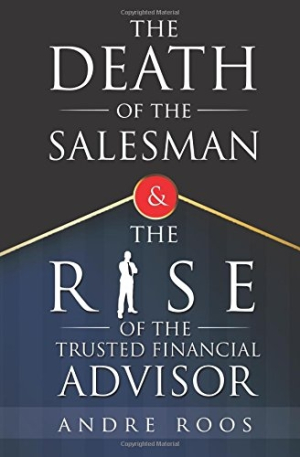The Death of the Salesman and the Rise of the Trusted Financial Advisor
The book’s wise advice is likely to be helpful to novice and experienced financial advisors alike.
Andre Roos advocates for consultative selling in his smart, authoritative book, The Death of the Salesman and the Rise of the Trusted Financial Advisor.
A financial advisor, Roos believes “yesterday’s sales tactics won’t work today” when it comes to doling out financial advice. Instead, he writes, it is essential to build long-term relationships with clients in order to build trust. Consultative selling is not a new concept, but this book relates it directly to financial advisement, providing specific recommendations.
The book recommends paring down an advisor’s clientele; the notion worked well for Roos but may generate surprise in the audience. The book radically suggests focusing on the one-third of a clientele with whom relationships can be built, referring the remaining two-thirds to others. Having a smaller number of clients allows an advisor to “devote quality time” to them, Roos says; he claims he actually does more business with a smaller client base than he could with a larger number of clients.
Another recommendation is to become a specialist: “seek out clients and prospects who are part of a particular niche.” The book wisely indicates that specializing can relate not just to an industry but to life stages and types of planning, such as estate planning. Specialization, as presented here, creates additional value and enables a financial advisor to earn higher fees.
Other interesting and beneficial ideas are shared in addition to these unique strategies, such as novel advice on leveraging relationships with a client’s other professional advisors. The book covers critical aspects of the profession, including personal presentation, communication, and body language; managing one’s “digital footprint”; and why being a “prophet of doom” is an uncomfortable but often necessary role for the financial advisor to play. A wealth of techniques are included. All of this material is likely to be helpful to novice and experienced financial advisors alike, though content is delivered in potpourri fashion, without cohesion between chapters.
The writing is personal and informal, supplementing counsel with relevant examples. Each chapter ends with “Success Action Steps” designed to help apply its content; they are helpfully reprised, in summary form, at the close of the book.
The book’s philosophy—that clients should be treated as assets or investments, to be “nurture[d] … over time”—makes sense for many businesses; while this book’s intended audience is financial advisors, it is likely that other professionals with client-based businesses could benefit from its wisdom.
Reviewed by
Barry Silverstein
Disclosure: This article is not an endorsement, but a review. The publisher of this book provided free copies of the book and paid a small fee to have their book reviewed by a professional reviewer. Foreword Reviews and Clarion Reviews make no guarantee that the publisher will receive a positive review. Foreword Magazine, Inc. is disclosing this in accordance with the Federal Trade Commission’s 16 CFR, Part 255.

